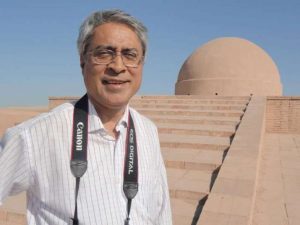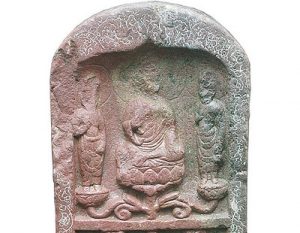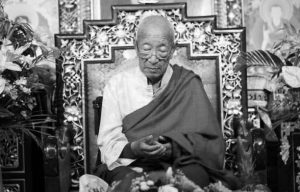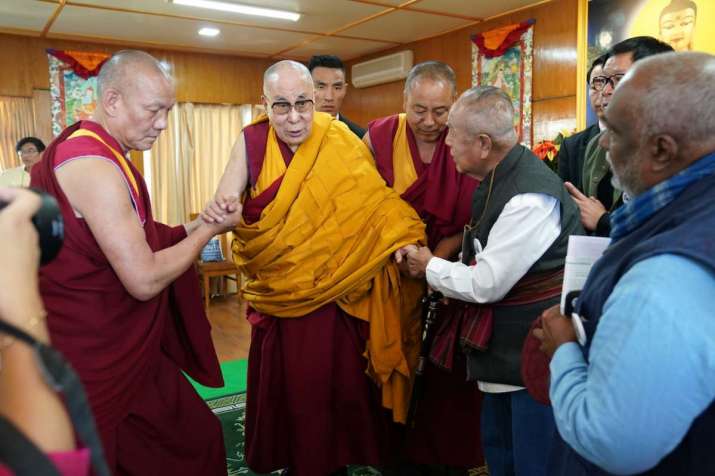
Updated with new images.
His Holiness the Dalai Lama on Monday held an audience with members of the International Network of Engaged Buddhists (INEB), led by the prominent Buddhist activist and intellectual Sulak Sivaraksa, at the official residence of His Holiness in Dharamsala, northern India.
The INEB members gathered from all over the world in Thekchen Choling to meet His Holiness, including 35 people from Thailand, 41 from India, 37 from Myanmar, as well as members from Bangladesh, Hong Kong, Hungary, Indonesia, Japan, Nepal, South Korea, Sri Lanka, Sweden, Switzerland, Taiwan, and the United States.
The INEB international Buddhist community was established in Thailand in 1989 by the prominent Thai academic, activist, and social critic Sulak Sivaraksa and a group of Buddhist and non-Buddhist thinkers and social activists, with the aim of connecting engaged Buddhists around the world and promoting understanding, cooperation, and networking among inter-Buddhist and inter-religious groups to address global issues, such as human rights, conflict resolution, and environmental concerns.
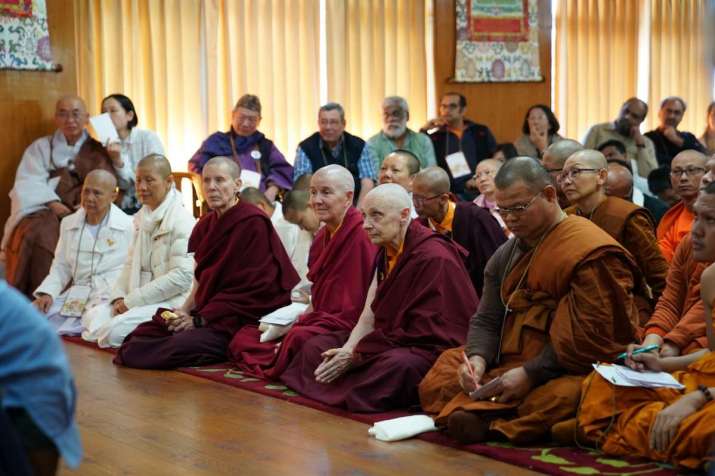
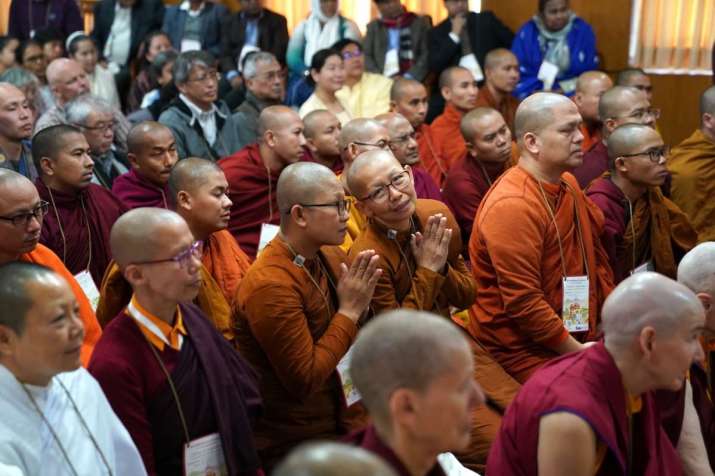
“As human beings, we all want to live a happy life, but we are regularly faced with problems of our own making,” the Dalai Lama told the assembled INEB members. “Many such problems arise because we persist in viewing others in terms of ‘us’ and ‘them.’ In addition to this, these days, we also see conflict taking place in the name of religion. There are differences between our religious traditions and even within them—for example the Pali tradition included 18 schools of thought, while within the Sanskrit tradition there were four. Different points of view appeal to people of different dispositions, but what is most important to remember is that all religious traditions stress the importance of cultivating loving-kindness.” (His Holiness the 14th Dalai Lama of Tibet)
“Now the time has come: the words Hinayana and Mahayana are not good; they create the wrong impression,” The Dalai Lama continued. “The Pali tradition is the basis of the Buddhadharma, and the Sanskrit tradition very much emphasizes using a logical approach. So these two traditions, I think, should now combine. Then we can go with modern science . . . if we carry the Buddhadharma with analytical meditation—analyze everything, not merely rely on faith—then this Buddhist faith can remain for at least another two or three centuries. But if the Buddhadharma is carried on faith alone, then, I don’t know, within one or two generations it may disappear. Therefore, I want to emphasize that we Buddhists should be 21st century Buddhists—study! And utilize human intelligence . . . combined with modern science.” (YouTube)
INEB’s audience with His Holiness came a day before the network members gather for the 19th Biennial INEB Conference and Celebrating 30th Anniversary of INEB, to be held at the Deer Park Institute in Bir, Himachal Pradesh, from 22–24 October. The conference, which is being held under the theme “The Culture of Awakening – Cultivating and Harvesting Wisdom,” seeks to address “the complexities and contradictions modern societies are facing” and to examine “whether the universal values of peace, freedom, and social progress are being upheld through human rights, dignity, and democratic principles,” by examining whether “these universal values conflict with, or complement Buddhist teachings and practice.” (INEB)
INEB stated that the overall objectives of the conference are to:
Reconnect to the rich Buddhist and spiritual heritage, its arts, customs, social institutions and achievements as a means of confronting contemporary forms of greed, anger, and delusion, such as consumerism, targeted acts of violence, and over immersion in social media.
Realize the benefits of awakening through transforming the contradictions perpetuated through globalization, structural violence, cultural intolerance and so forth. The new realization can happen through social action in areas of environmental resilience, peaceful coexistence for pluralistic societies, gender equality, youth empowerment, and sustainable growth.
Celebrate INEB’s 30th Anniversary and expand the spirit of kalyanamitra* among the INEB members and beyond. (INEB)
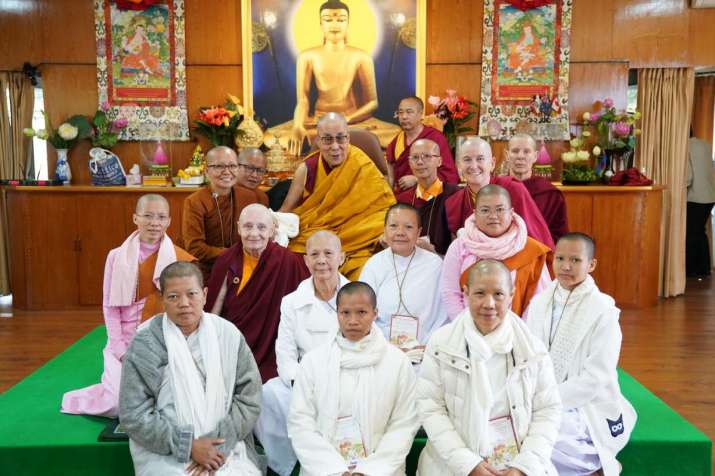
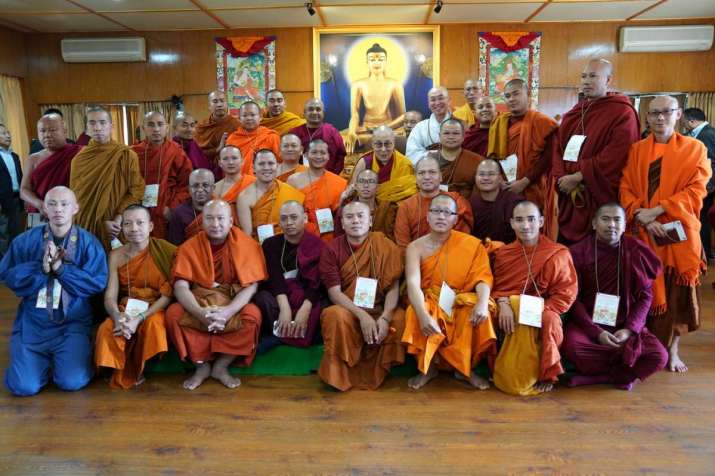
Founded as an autonomous organization under the Bangkok-based Sathirakoses-Nagapradeepa Foundation, INEB’s members include monks, nuns, activists, academics, and social workers from more than 25 countries in Australasia, Asia, Europe, and North America. While a Buddhist organization, INEB welcomes members from other spiritual traditions and recognizes the importance of interfaith activities, stating: “INEB’s philosophy and practice is based on compassion, social justice, non-violence, and co-existence as put forth by Gautama the Buddha. The network’s core mission is to confront and end suffering using analysis and action guided by the Four Noble Truths.” (INEB)
* A spiritual friend; from: kalyaṇa-mittata (Pali) kalyaṇa-mitrata (Skt.), the Buddhist concept of “spiritual friendship.”
See more
Meeting with Engaged Buddhists (His Holiness the 14th Dalai Lama of Tibet)
Talk to Members of the International Network of Engaged Buddhists (YouTube)
International Network of Engaged Buddhists (INEB)
INEB – International Network of Engaged Buddhists (Facebook)







